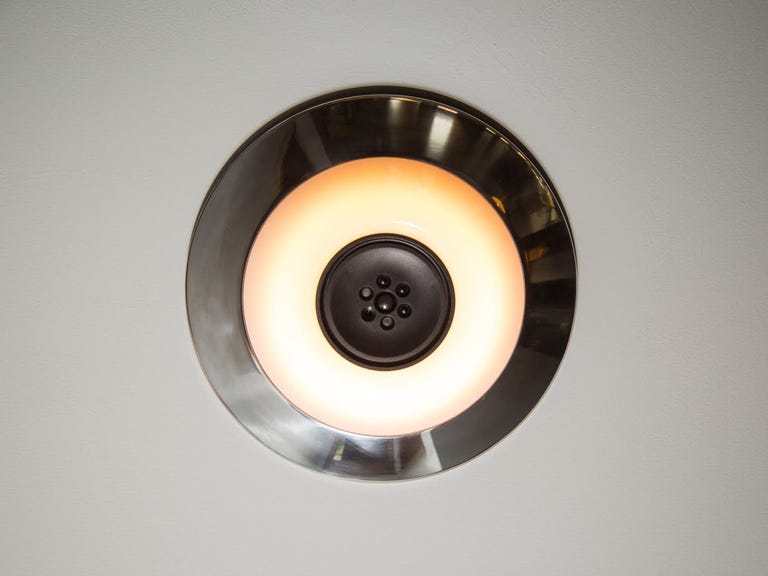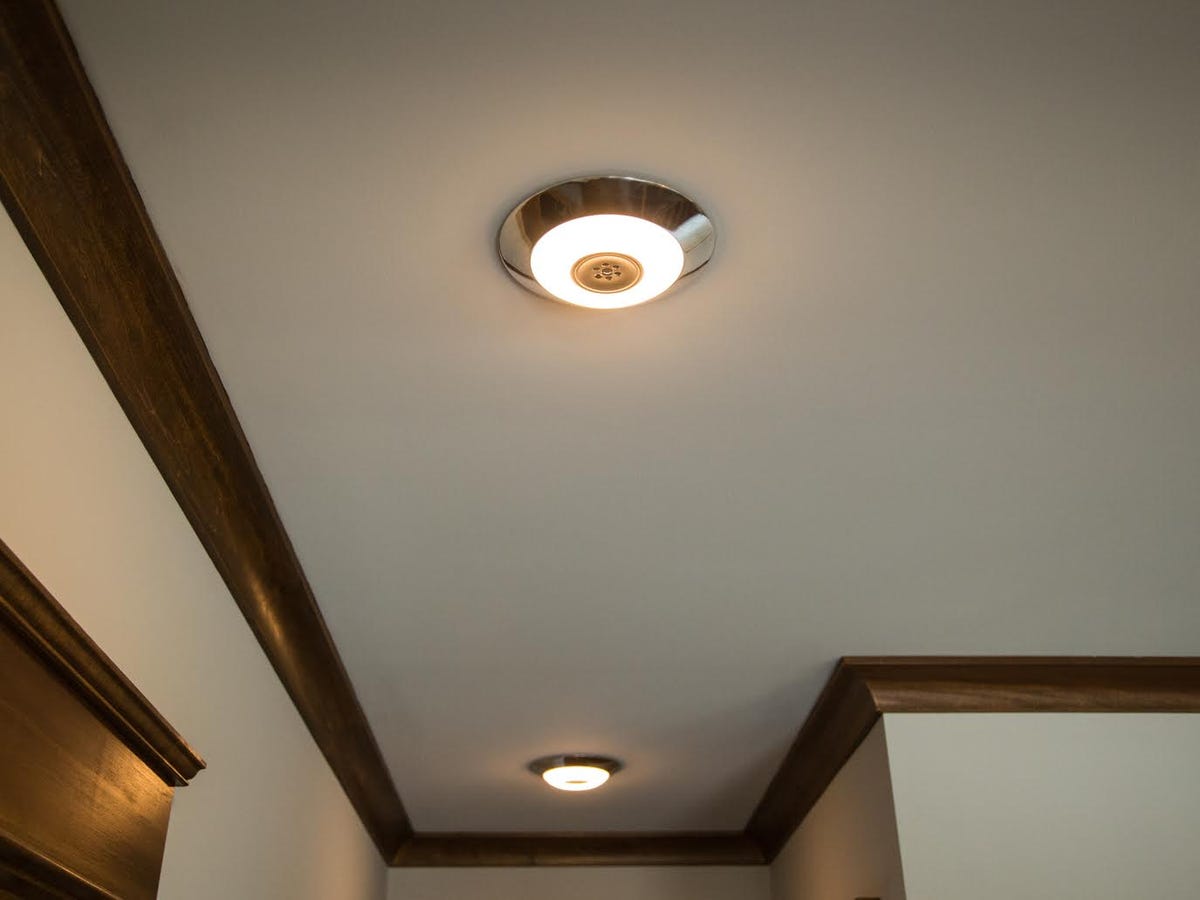 Why You Can Trust CNET
Why You Can Trust CNET Haiku Home Haiku Light review: A smart, elegant light source for the high-end connected home
They sure aren't cheap, but these smart, recessed light fixtures from Haiku Home pack built-in motion sensors and compatibility with Amazon's Alexa.
There are plenty of smart lighting options that you can control with an app or even with your voice, but you'll find few perfect solutions for smartening up an all-in-one, built-in recessed fixture. In many cases, there might not be any bulb at all to swap out, and most smart switches won't let you dim the lights.
The Good
The Bad
The Bottom Line
Enter Haiku Home, the smart home division of Lexington Kentucky's Big Ass Solutions (known best for its eponymous Big Ass Fans). In addition to smart ceiling fans, the brand offers high-end indoor/outdoor recessed lighting fixtures with connected smarts. Along with flipping the switch like normal, you can control them using the Haiku app, using the same remotes and smart switches that control Haiku fans, or by connecting them with Amazon's Alexa for voice-activated lighting changes. They'll also change between warm and cool color temperatures, and turn on and off automatically based on motion below.
The Haiku Lights don't come cheap, starting at $149 a pop. But they look terrific and work exceptionally well, offering seamless smarts for high-end smart homes. If you're looking for something luxurious, or if you've already bought into the Haiku ecosystem with a ceiling fan or two, then they deserve some consideration.
We installed several Haiku Lights in the CNET Smart Home to test out their connected capabilities. And, by and large, they're some of our favorite things in the place. The motion sensors are swift and responsive -- whenever one of us walks in through the garage, a light in the entryway "sees" us and lights up the entire hallway for us. After two minutes of inactivity (you can customize this length in the Haiku app on your Android or iOS device), they dim back down, ready to light up again whenever someone passes through.
That sort of "set-and-forget" approach is the Haiku Light's strongest asset. It's been months since I programmed these things, and they've worked perfectly ever since. None of us have needed to use the app for anything. They just work.
Of course, you can still turn the lights on and off at the switch like normal -- doing so won't reset any of your settings. There's also a handy little remote that'll let you control any individual light you point it at. And, if you're an Amazon Echo user, you can ask Alexa to turn the lights on and off, or dim them up and down. They're compatible with the Nest Learning Thermostat -- though Haiku's integration is obviously geared more towards its ceiling fans.
They're also nice and bright. Haiku pegs them at a healthy 1,348 lumens each, which is roughly halfway between a 75 and 100W bulb. Couple that brightness with the circular overhead design, and you get a nice, even dispersion of light from each one, and more than enough brightness for most needs (we typically keep the ones in the CNET Smart Home dialed down to about 50 or 60 percent).
The Haiku Light lineup
| White | Black | Satin Nickel | Oil Rubbed Bronze | Polished Aluminum | |
|---|---|---|---|---|---|
| "Select" (2,700 K) | $149 | $149 | N/A | N/A | N/A |
| "Premier" (2,200 - 5,000 K) | $199 | $199 | $199 | $199 | $299 |
Haiku's lights come in five different finishes, and prices vary depending on which style you choose. Standard white and black "Select" models come cheapest at $149 if you're willing to pass on color tunability and stick instead with a single, yellowy tone of light. For fifty dollars more, you can go with a "Premier" model -- that'll add in the cool, bluish white, daylight end of the spectrum, and let you dial in on your exact white light shade of choice.
For $125, you can add a Haiku Wall Controller and use it to control or automate multiple lights at once.
For an additional $125, you can also pair your lights with a Haiku Wall Control. A somewhat odd-looking little switch, the Wall Control can pair with several lights at once (and with Haiku's smart ceiling fans) to offer a dedicated control point for everything. It also packs an additional motion sensor -- a handy way to, say, trigger the lights at the top of the stairs as you approach from below.
Handy as it may be, the Wall Control is a pure extra. Skipping it won't cost you any connected features.
As for security, Haiku's team tells me that they protect their products from malicious attacks using industry-standard end-to-end encryption. The lights don't use the kinds of hard-coded, default passwords that make devices vulnerable to a DDOS attack like the one from a few weeks ago that brought much of the internet to a standstill. They also require a secure home connection, and don't allow users to access their lights from outside of it. That's a bit limiting if you want to be able to control your lights when you aren't home, but the fact that you can schedule them, or set them to turn off automatically when motion stops helps mitigate things somewhat.
The verdict
I can't afford to fill my home with these lights, but if I could, I'd be tempted. They look terrific and work well, offering true set-and-forget intelligence. The addition of built-in, super-reliable motion detection helps them justify the cost somewhat, and native compatibility with Alexa is a nice cherry to top things off.
Still, you don't need to pay this much for smart lighting. If your overhead lights allow you to swap out the bulb, you can save money by going with LED floodlights from Philips Hue or Lifx, both of which are just as compatible with Alexa as Haiku is. The same goes for Stack's LED floodlights -- and on top of that, they include built-in motion detectors of their own. If bulbs aren't an option, then consider upgrading your light switches -- Lutron Caseta switches would be my recommendation, since they work with both Alexa and Siri, and, unlike a lot of smart switches, let you dim the lights, too. All of those worthy alternatives cost less per light than Haiku.
None of them are quite as classy as Haiku, though, and since lighting is an ever-important part of home decor, that's worth considering. Bottom line: they're priced like high-end lighting products because they are high-end lighting products. If they fit into your aesthetic (and your budget), then splurge with confidence.



